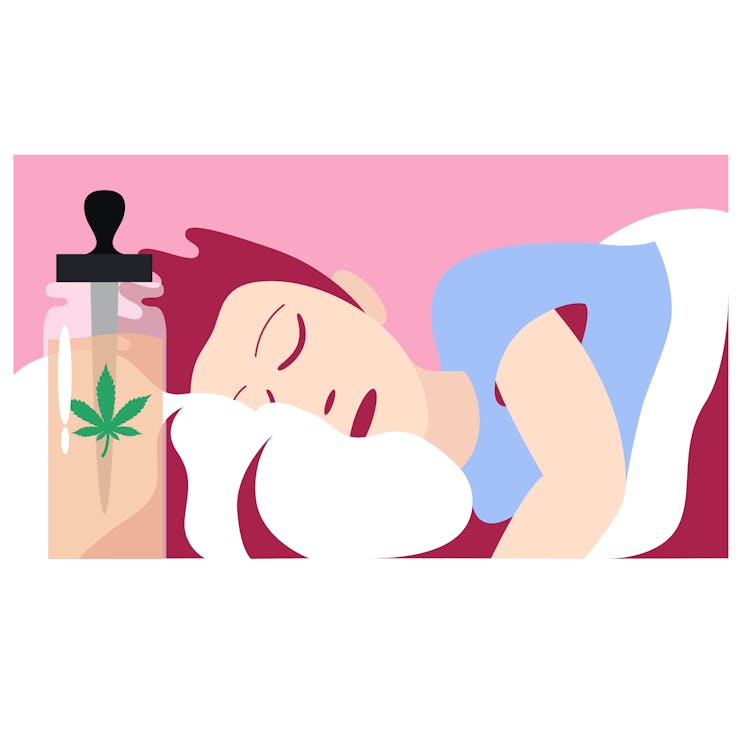Weed for sleep: Your guide to using cannabis for better rest
Scientists doubt cannabis' supposed sleep benefits — but if you're going to use it anyway, here's what you need to know.

Weed may make you drowsy, but whether or not cannabis actually helps people sleep better is a little more difficult to determine.
To try and get to the bottom of whether cannabis can help you sleep, Inverse took a hard look at the science. Unfortunately, there is not a lot of science on what marijuana does to the body — federal laws make studying cannabis, a Schedule 1 drug, extremely difficult. Here's what we found.
A study published this week in the journal Supportive & Palliative Care finds that taking medical cannabis may help people sleep through the night, but it isn't a good long-term solution. Users can build a tolerance to its sleep-inducing qualities, diminishing its effects over time, the study suggests.
The findings are based on 128 individuals over age 50 who have chronic pain. While not a huge sample size, it is higher than most cannabis-related studies.
Another study published in 2016 in the Journal of Addictive Diseases looked at cannabis-use patterns and sleep in 98 people who were mostly in their early twenties. Regular pot use was correlated with sleep disturbance, with daily users scoring higher on a measure of sleep quality called the Insomnia Severity Index. The finding contradicts the cherished stereotype that marijuana chills you out. Rather, the findings hint at an association between regular cannabis use and anxiety — potentially compounding sleep issues.
"There are strains that won’t necessarily put you to sleep and knock you out, but you’re not going to want to get up off the couch."
Despite the contradictory evidence, people really believe in the sleep-inducing powers of pot. A 2019 survey of 1,000 people found that that three-quarters of them had tried using pot to help them sleep — 84 percent of those who tried it said they found it helpful. A similar number said they’d stopped taking other sleep aids in favor of cannabis. The survey was published in a study in the Journal of Psychoactive Drugs. The problem with this study is that it was self-report — it's difficult to know how much of the effect was down to belief in the drug's powers, rather than the effects of the drug itself.
Taken together, the studies show a clear divide between research and perception. Which begs the question: Why do so many people swear by cannabis as a sleep aid?
Examining the evidence
As scientists debate the merits of using cannabis for help sleeping in journals, the conversation has played out in another, more-accessible place: Reddit.
Here, Inverse went to the most obvious place for discussions about bad sleep — subreddit r/Insomnia. In a post discussing the merits of cannabis for sleep, u/StonerMeditation commented that cannabis has helped to bring on sleep for a decade.
“I've been using MJ as a sleep aid for over 10 years. It's truly wonderful, and besides a groggy head for a half hour after waking (before coffee) there are NO side effects.”
But another comment in the same thread, from a now-deleted account, gets at the same short versus long-term benefits scientists have observed.
“I picked up MJ use at age 28 specfically [sic] for sleep, at first I was out in 20 mins and over the past 5-6 months the effects have waned. It no longer knocks me out, there are days where I toss and turn.”
But cannabis made them feel better about the tossing and turning that comes with poor sleep — it was less bothersome to them, and “that alone helps me sleep," they said.
Quelling anxiety about sleeplessness may be useful, but it isn't the same as improving sleep quality. Natural supplements used as sleep aids, like melatonin, chamomile, and valerian, can have calming effects on the body and mind, too, contributing to the relaxation that tends to precede a good night’s sleep.
Taking marijuana for sleep
If the murky science doesn't put you off and you stand by the idea that cannabis is a viable sleep aid, there are steps you can take to make it safer and more efficient.
The website WoahStork, founded by Nicco Reggente while a graduate student at University of California, Los Angeles, has information on the various strains of cannabis and how they differ in targeting your endocannabinoid system — that's the body's cell-signaling network that responds to cannabinoids, like CBD and THC, which are the compounds in marijuana. The endocannabinoid system plays a role in sleep, mood, appetite, and memory. As Inverse has previously reported, WoahStork is basically the Netflix of weed, with a “Strain Genie” that helps users find the right strain for them.
With regard to sleep, Reggente told Inverse in 2016 that certain strains can alter your mental state in specific ways — including making you feel sleepy. But that seems to have more to do with the zoned-out grogginess that taking certain types of weed can induce. But be careful: Not all strains have that effect.
“If you just look at ‘chill and sleepy,’ there are strains that won’t necessarily put you to sleep and knock you out, but you’re not going to want to get up off the couch,” Reggente said. “And then there are strains where you can still be productive, explore, and certain strains can actually be quite psychedelic.”